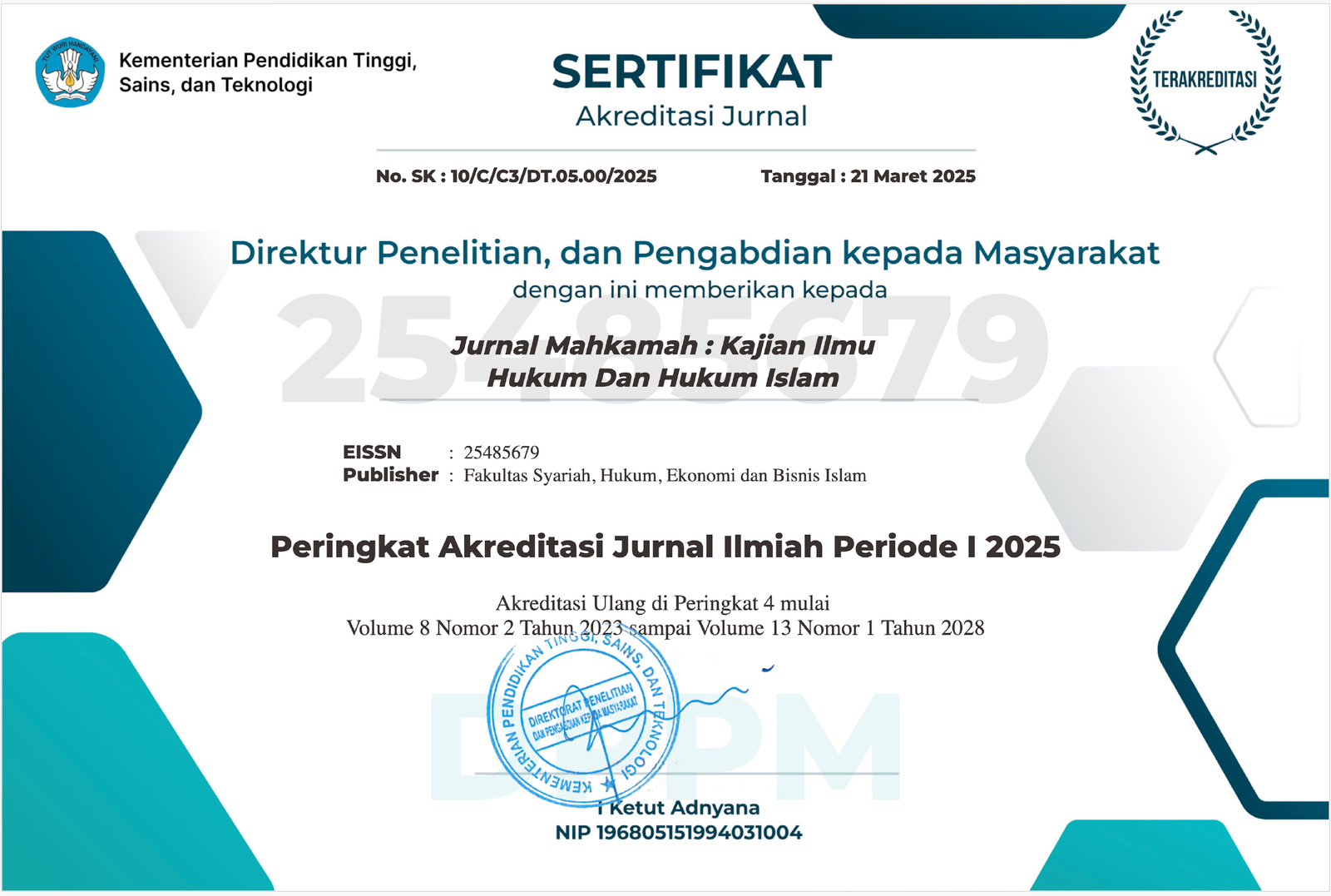The Analysis of Judge Considerations in Decision Number 0077/Pdt.P/2019/PA.Tnk Concerning Marriage Dispensation and Its Implications Viewed from Mashlahah Perspective
DOI:
https://doi.org/10.25217/jm.v7i2.2687Keywords:
putusan, pertimbangan hakim, dispensasi nikah, maslahatAbstract
Marriage dispensation is the granting of marriage permits to brides who are not yet of the age specified in the law with clear reasons, for example in this study dispensation is given to brides who have been permitted to marry by their parents, what is interesting from this research is the basic considerations of judges in giving perspective marriage dispensation problem. The main problem to be examined is the judge's consideration in the decision Number 0077/Pdt.P/2019/PA.Tnk regarding the dispensation of marriage and its implications. This research is a qualitative research with literature study(library research), characteristic descriptive analytic. The results of this study are: First, the judge's consideration is the most important aspect in determining a decision that contains legal certainty, justice, and contains benefits for the parties concerned and justice seekers. Viewed from perspective problem then the granting of a marriage dispensation in the decision is in accordance with maslahah ad-daruriyyah or fit for purpose advice' in order to safeguard the five aspects of Islamic law, namely safeguarding religion, soul, intellect, lineage and property which will certainly benefit the bride and her family, if this is not continued it will result in mafsadah. Second, Implications of the Judge's Decision Number 0077/Pdt.P/2019-/PA.Tnk regarding marriage dispensation has positive implications for the bride and her family, by granting permission to marry it will clarify the status of the child, avoid negative views from society and avoid acts adultery which is prohibited by religion
References
Abu Ishaq Ibrahim bin Musa bin Muhammad al-Lukhmi al-Syathibi. (1998). Al-Muwafaqat, jilid 2, al-Mamlakah al Arabiyah al-Su’udiyah. Dar al-Affan.
Adhari, M. N., Aidhil Alwana, H., & Rio, W. (2022). Paradigma Dispensasi Perkawinan di Pengadilan Agama Muara Labuh Antara Maslahah dan Inkonsistensi Hukum. Journal of Sharia and Law Studies, 10(1), 22.
Agus Khalimi, Triana Sofiani, & Tarmidzi. (2021). Dispensasi Nikah Perpektif Mashlahah. Al Hukkam Jurnal Of Islamic Law, 1(2), 1.
Ahmad al-Raisuni. (1999). Al-Fikru al-Maqasidi Qawa’iduhu wa fawa’iduhu. Ribat.
Al-Quran Dan Terjemah. (n.d.). Departemen Agama RI.
Amir Syarifuddin,. (2009). Ushul Fiqh Jilid II. Kencana.
Boedi Abdulla. (2013). Perkawinan dan Perceraian Keluarga Muslim. Pustaka Setia.
Eka Gifriana, H.B.Syafuri, & H. E. Zaenal Mutaqin. (2022). Dispensasi Nikah Usia Dini: Perspektif Maslahah Mursalah (Analisis Yuridis Putusan Perkara Nomor : 1635/Pdt.P/2019/Pa.Srg). Journal of Legal and Cultural Analytics, 1(3), 199–216. https://doi.org/10.55927/jlca.v1i3.1284
Hasan Baharun & Syafiqiyah Adhimiy. (2018). Limitasi Keluar Rumah Bagi Perempuan ‘Iddah Wafat dalam Perspektif Maslahah Mursalah. Jurnal Al’Adalah, 15(1), 158.
Hasto Wardoyo. (2019). Kuliah Umum Di STKIP Bangka Belitung.
Putusan Mahkamah Agung, Nomor 0077/Pdt.P/2019/Pa.Tnk.
Melinda Rahmawati & Heni Ani Nuraeni. (2021). Peran Dispensasi Kawin dalam Peningkatan Angka Pernikahan Dini di Wilayah Kotamadya Jakarta Barat. Jurnal Al-Istinbat, 6(1), 5.
Menyorot Mahkota Hakim Peradilan Agama. (n.d.). Majalah Peradilan Agama.
Muhammad Amin Suma. (2004). Hukum Keluarga Islam di Dunia. RajaGrafinfo.
Nur Yasin. (2008). Hukum Perkawinan Islam Sasak. UIN Malang Press.
Poerwa Darminta. (2011). Kamus Umum Bahasa Indonesia. Balai Pustaka.
Sobri Mersi al-Faqih. (2015). Solusi Problematika Rumah Tangga Modern. Sukses Publising.
Umar Haris Sanjaya & Aunur Rahim Faqih. (2017). Hukum Perkawinan Islam di Indonesia. Gama Media.
Undang-Undang Perkawinan, Nomor 16 Tahun 2019 Tentang Perkawinan.
Wasman. (2011). Hukum Perkawinan Islam di Indonesia:Perbandingan Fiqih dan Hukum Positif. Teras.
Zainudin Ali. (2011). Metode Penelitian Hukum. Sinar Grafika.
Downloads
Published
How to Cite
Issue
Section
License
Copyright (c) 2023 Hervin Yoki Pradkta

This work is licensed under a Creative Commons Attribution-ShareAlike 4.0 International License.
This work is licensed under a Creative Commons Attribution-ShareAlike 4.0 International License.
Authors retain copyright and grant the Jurnal Mahkamah : Kajian Ilmu Hukum Dan Hukum Islam right of first publication with the work simultaneously licensed under a Creative Commons Attribution License (CC BY-SA 4.0) that allows others to share (copy and redistribute the material in any medium or format) and adapt (remix, transform, and build upon the material) the work for any purpose, even commercially with an acknowledgment of the work's authorship and initial publication in Jurnal Mahkamah : Kajian Ilmu Hukum Dan Hukum Islam.
Authors are able to enter into separate, additional contractual arrangements for the non-exclusive distribution of the journal's published version of the work (e.g., post it to an institutional repository or publish it in a book), with an acknowledgment of its initial publication in Jurnal Mahkamah : Kajian Ilmu Hukum Dan Hukum Islam.
Authors are permitted and encouraged to post their work online (e.g., in institutional repositories or on their website) prior to and during the submission process, as it can lead to productive exchanges, as well as earlier and greater citation of published work (See The Effect of Open Access).









